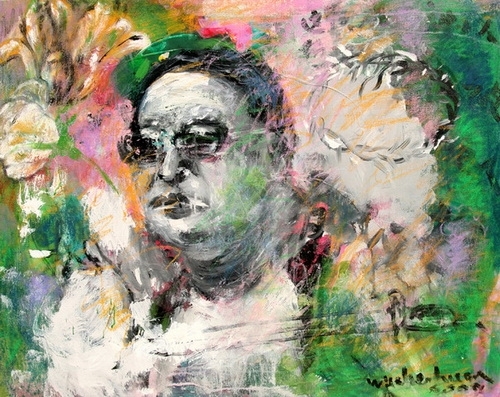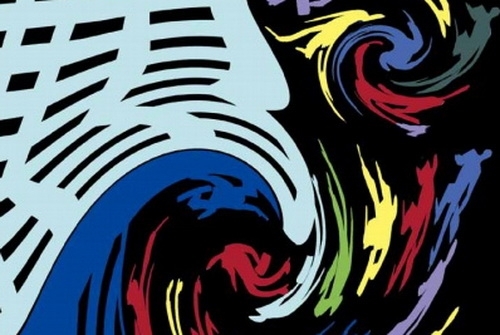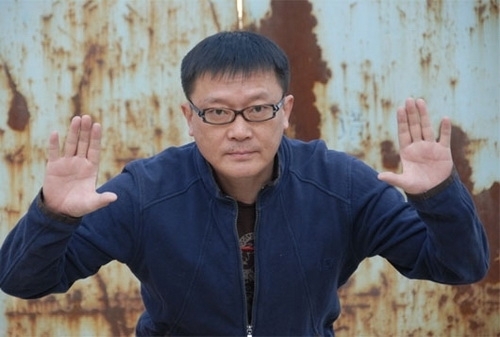


Flowers and Sword: Poet Yu Xinqiao by Wu Zhenhuan
Yu Xinqiao (余心樵): Memories Turn Potatoes Into Stars
[Books & Portraits]
By Yu Yishuang(于一爽)
Page 17-20
Original Text: [Chinese]
Artist and poet Yu Xinqiao was first gained public prominence after his poem "Longing For Heroes" (《渴望英雄》) was published in China Youth Daily on Apr 22, 1989 to mark the passing of Hu Yaobang (胡耀邦). The poem itself had actually been written a year before it was published and Yu had sent it to a female friend whose father happened to work at the paper.
Yu's "The Epitaph" (《墓志铭》), which contains the oft-quoted line, "In my country, only if you haven't read my poems, can you not have loved me," was written at the north entrance to Tsinghua University on Sep 2, 1989 when the author was suddenly overcome with a strong desire to express himself.
In another poem written in 1989, Yu wrote the lines - "I will move to a safe place to love you."
Yu was also an important member of the "painters' village" that emerged in Yuanmingyuan in the late 1980s.
In 1993, when Yu was about 25 years old, he began to promote a movement aimed at reviving Chinese art, he published articles and gave lectures at universities in Shanghai and Hangzhou. Though the movement initially gained the support of influential scholars and officials, many began to oppose the "revival," which soon morphed into a broader push to revive Chinese culture, some feared that Yu was trying to launch a second round of the cultural revolution. Eventually, Yu's activism led to him being arrested and sentenced to eight years in prison in 1999.
Yu thinks that good poems should not only reflect the society, but also serve as a point of connection.
Yu recently exhibited some of his works at the Taida Modern Art Gallery and he plans to fly to Berlin later this year for an exhibition. He hopes that his paintings and poems can play off each other.

Three Gorges Dam: A Symbol of China's Modernization
[Highlight]
By Tan Xufeng (谭旭峰)
Page 22-30
Original Text: [Chinese]
On Sep 10, 2006, Belgian Zou Hongping (邹宏平) described what he saw at the Three Gorges in his Letters Home from the Three Gorges (三峡家书). The water "will inundate 30% of the land that I can still see now. In the past three weeks, the land is like people sleeping next to me and people breathing with me. It's not hard to imagine the feelings of local people who have been living here for century." The ancient harmony with nature in China has already been replaced by the modern conquest of nature.
Five years later, in September, 2011, Tan Xufeng returned to the Three Gorges area. He describes us the great electricity producing capacity of the dam along with the dark villages on the banks. Zou also contrasts the new commercial street in Fengjie (奉节) with the private museum which honors Fengjie's old town - "the underwater old city of thousands of years."
Chonqing scholar Wang Kang (王康), a folk philosopher and researcher who specialises in Russian studies and Confucianism, also talks about the Yangtze River, the Three Gorges dam and the traditional and modern in China.

The Lurker Jiang Wei(姜伟)
[Highlight]
By Xu Qingquan (徐庆全) (Deputy Editor-in Chief of Yanhuangchunqiu《炎黄春秋》)
Page 31-37
Original Text [Chinese]
Jiang Wei is best known for writing and directing the popular tv spy drama Lurking (《潜伏》 qiánfú), which began screening on Chinese TV in 2008, but before that, Jiang had also been a bit of a "lurker" himself.
After four years immersed in poetry, detective novels and films while studying in the history department of Qufu Normal University (在曲阜师范大学) from 1982, Jiang went on to work as a librarian in Shandong Normal University for seven years, though he now refers to it as "a position better suited for girls."
In the 1990s, Jiang was determined to find his own path and was admitted as a postgraduate student at the prestigious Beijing Film Academy, where he started out on his career as a director. Since then he has produced successful works such as Don't Talk With Strangers (不要和陌生人说话) and Lurking.
In this month's issue of the EO's Book Review, Jiang talks about the filming and production of Lurking with his old classmate Xu Qingquan.

